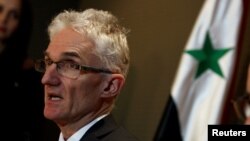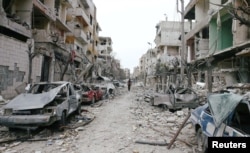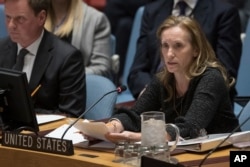U.N. envoy for Syria Staffan de Mistura says the world body "has not and will not" give up in demanding implementation of a 30-day cease-fire across Syria.
Speaking Thursday in Geneva, de Mistura said both pro-government and opposition forces must stop shelling each other and allow for aid convoys to reach civilians, particularly in the rebel-held eastern Ghouta area.
"We don’t have and we cannot afford to have the luxury of giving up, so any type of feeling that the U.N. is frustrated, forget it. We are not frustrated, we are determined, because this otherwise becomes the copycat of Aleppo," de Mistura said.
The U.N. Security Council resolution on Saturday demanding the month-long cessation of hostilities to allow aid in and evacuate the critically sick and wounded, especially from eastern Ghouta, which has been under siege since 2013.
U.N. aid chief Mark Lowcock asked Wednesday when the halt in fighting will be put into effect.
"So if there has been no humanitarian access since the resolution on Saturday, what has happened in the last few days?" Lowcock rhetorically asked. "More bombing. More fighting. More death. More destruction. More maiming of women and children. More hunger. More misery. More, in other words, of the same," he said.
Lowcock said the United Nations and its partners were ready with trucks full of humanitarian aid and medical evacuation plans and could begin work once the guns fall silent and access is granted in Syria.
He cited reports of government airstrikes, barrel bombs and shelling across eastern Ghouta and a dozen other districts two days after the cease-fire was adopted. Lowcock said shells fired from eastern Ghouta had also reportedly continued to fall in the Syrian capital.
"Over 580 people since 18 February are now reported to have been killed due to air- and ground-based strikes in eastern Ghouta, with well over 1,000 people injured," he said. "At the same time, hundreds of rockets from eastern Ghouta into Damascus have reportedly killed 15 people, and injured over 200."
Russian 'pause'
Russia, which supported the cease-fire resolution, said it would implement a daily five-hour "humanitarian pause" in its military operations around eastern Ghouta, where 400,000 civilians are besieged.
Lowcock said that wouldn't provide enough time for humanitarians to deliver aid and conduct medical evacuations.
Several council members criticized the Russian proposal.
"This is cynical, callous and in flagrant defiance of the demands of [Resolution] 2401," said U.S. envoy Kelley Currie. "The cessation of hostilities is for at least 30 days, every day, all day. Russia does not get to unilaterally rewrite the terms of the resolution they negotiated and they sat here and voted for."
The sentiment was shared by Britain's U.N. ambassador.
"Humanitarian pauses of a few meager hours are no substitute for a sustained cease-fire, which is vital to ensure delivery of lifesaving humanitarian assistance and medical evacuations," British envoy Jonathan Allen said. "If Russia is able to deliver a five-hour pause, let it deliver a 24-hour one, as they agreed on Saturday."
Russia's envoy responds
"Only our country is called upon to implement Resolution 2401," Russian Ambassador Vassily Nebenzia said with visible irritation. "We are criticized for humanitarian pauses. There are assertions that there are insufficient numbers of them. There are demands, demands, demands. For some reason, someone is always demanding something in an authoritative tone from the Russian Federation."
Nebenzia accused council members of misinterpreting the resolution, saying pauses must be preceded by an agreement of the parties on the ground for de-escalation.
Armed groups
The main armed groups in eastern Ghouta sent a letter to the U.N. Security Council on Tuesday saying they were ready to abide by the cease-fire and guarantee protection for aid convoys to their areas.
Representatives of Jaish al-Islam, Failaq al-Rahman and Ahrar al-Sham also agreed to expel, within 15 days of the truce going into effect, elements of banned groups Hay'at Tahrir al-Sham, the Nusra Front and al-Qaida who have taken refuge in eastern Ghouta.
Several Security Council members welcomed this as a positive move.
Meanwhile, the Britain-based Syrian Observatory for Human Rights reported more fighting Wednesday in eastern Ghouta.




